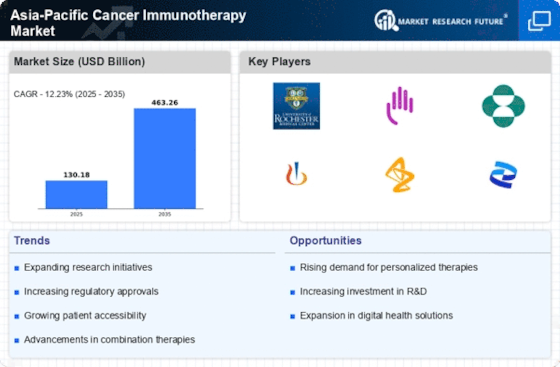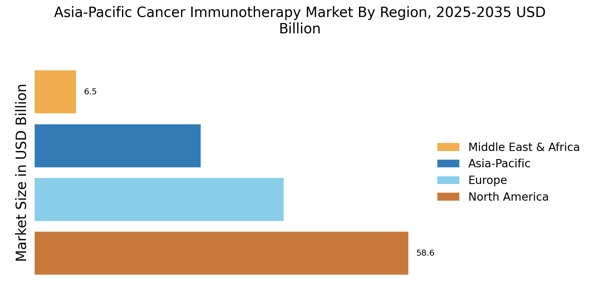Leading market players invested heavily in research and Development (R&D) to scale up their manufacturing units and develop technologically advanced solutions, which will help the Asia-Pacific Cancer Immunotherapy market grow worldwide. Market participants are also undertaking various organic or inorganic strategic approaches to strengthen and expand their global footprint, with significant market developments including new Type portfolios, contractual deals, mergers and acquisitions, capital expenditure, higher investments, and strategic alliances with other organizations. Businesses are also coming up with marketing strategies such as digital marketing, social media influencing, and content marketing to increase their scope of profit earnings.
The Asia-Pacific Cancer Immunotherapy industry must offer cost-effective and sustainable options to survive in a highly fragmented and dynamic market climate.
Manufacturing locally to minimize operational expenses and offer aftermarket services to customers is one of the critical business strategies organizations use in the Asia-Pacific Cancer Immunotherapy industry to benefit customers and capture untapped market share and revenue. The Asia-Pacific Cancer Immunotherapy industry has recently offered the Advanced Materials industry significant advantages. Moreover, more industry participants are utilizing and adopting cutting-edge technology has grown substantially. Major players in the Asia-Pacific Cancer Immunotherapy market, including Amgen, Inc. (US), Bristol-Myers Squibb Company (US), Eli Lilly and Company (US), and AstraZeneca Plc. (UK), GlaxoSmithKline Plc. (UK), Bayer AG (Germany), F.
Hoffmann-La Roche Ltd. (Switzerland), Pfizer, Inc. (US), Merck & Co., Inc. (US), Novartis AG (Switzerland), Spectrum Pharmaceuticals Inc. (US), Janssen Biotech Inc. (US), Sanofi (France), AbbVie Inc. (US), Takeda Pharmaceuticals (Japan), Oncomed Pharmaceuticals (US) and Immunomedics (US) are attempting to expand market share and demand by investing in R&D operations to produce sustainable and affordable solutions.
Roche has become one of the biggest worldwide biotech firms, an established manufacturer of in-vitro tests, and a global developer of transformational new solutions in significant disease areas. Roche Holding AG is a healthcare research firm. It works in two categories: diagnostics and pharma.
In May Roche Pharma launched PHESGO, which was the initial fixed-dose oncology creation that combines a pair of monoclonal antibodies, Perjeta along with Herceptin, with hyaluronidase, given by injection under the skin alongside intravenous chemotherapy, for the therapy of early-stage and metastatic HER2-positive breast cancer.
AstraZeneca Plc is a pharmaceutical holding company that conducts research, development, and manufacturing. Its pipeline is utilized for Cancer, cardiovascular, renal, metabolic, and respiratory therapies. The firm was created on June 17, 1992, and is based in Cambridge, England.
In July they said its immunotherapy medication Imfinzi had won regulatory clearance in Japan for novel applications of two major cancer treatments.


















